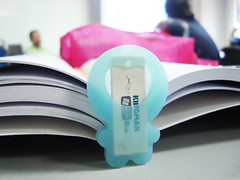1. Write Substance
Ask yourself before every post, "What is this post really about? " You should never write a post simply because you feel the need to post today or you made a goal to always post on Wednesdays. Each post should be focused around a clear main idea or subject. Similarly, avoid fluff. Fluff introductions or conclusions that don't really say anything should be rewritten or eliminated. Don't write for a word count, write for substance.
2. Make Your Headlines as Strong as Your Content
A headline is generally what draws the reader to the post in the first place. Make it count. You want your headlines to entice readers, to make them click on as many of your posts as possible. You won't achieve this with boring headlines. Use strong verbs and avoid passive tense. Make the reader want to know more about your topic.
3. Banish Text Blocks
No one wants to read a 1000 word paragraph, least of all your flighty internet readers. The internet audience has a notoriously low attention span, so make it easier to skim your writing by using frequent paragraph breaks and subject headers. It makes a large portion of copy seem much less intimidating. Headers also help the reader get the most out of your text by giving them an introduction and an preliminary concept to the following section. Basically, it gives your readers a "starting point" for the attached section. Pictures, videos, and short bulleted lists also serve as excellent text breakers.
4. Utilize Lists
People, especially web readers, love lists. It's comforting to have a large portion of information broken down into bite-size tips or steps. Lists are easy to skim, easy to digest, and easy to remember. It's why we make grocery lists instead of grocery prose.
5. Self-link
Once you've snared a new reader, what's to stop them from leaving your page immediately after reading your article? Internal linkage can be a blogger's best friend for keeping readers around for a while. Internal links are links to other posts or content within your blog. For example, if you briefly discuss hummus in an article about healthy eating, link to a previous post about hummus recipes. If you mention an actress in your fashion blog that you've talked about before, link to all articles featuring that actress. By including more links, you're giving readers the option to read more of your work about something they're already interested in.
6. Don't Ignore Your Readers
Engage them. Respond to their comments and suggestions. One of the best tried-and-true blogging tips is to ask for your readers' input or suggestions at the end of each article. When you show an interest in your readers' opinions, they're more likely to share them and join the conversation. After all, the capacity for instant reader-author conversations is what distinguishes the blogosphere from traditional print mediums.
7. Proofread, Proofread, Proofread
It may seem obvious, but small grammatical/spelling mistakes make your blog look amateurish. Don't forget to fact check all of your posts as well. Incorrect information discredits your voice and your blog. Remember, editing your posts is every bit as important as writing them. If you can, put your post away for a few hours and look at it again later. Distancing yourself from a post will help you catch errors you wouldn't have noticed earlier.
8. Tighten Your Posts
Once you're done checking for grammatical, factual, and spelling errors, go back and remove any clichés or unnecessary words. Anything you can do to shorten your post will improve your writing immensely. Look closely at every adverb and adjective. Do you really need them? Nine times out of ten you'll find these words are unnecessary, especially in informative articles.
9. Don't Be Too Formal
Even if you have a doctorate in English literature, there's no need to show off those big words. Never use a ten-letter word when a four-letter word will do. You'll wind up isolating your audience. Also, remember that blog writing is much more informal than a newspaper or technical writing. Blogging is conversing, so strike up a conversation with your readers. A welcoming, informal tone is much more inviting for visitors.
10. Write Often and Write Well
Writing is a skill. While some people may have a gift for words, they still need to hone their writing skills just like everyone else. Writing frequently will keep your skills sharp and refined. However, you're not doing yourself any favors if you consistently write sloppily. Treat your blog with a high regard and aim to make every post an example of your best writing.
About the author
James Adams is one of a small team of writers who work atwww.cartridgesave.co.uk, a leading UK based supplier of ink cartridges.
original content is here
